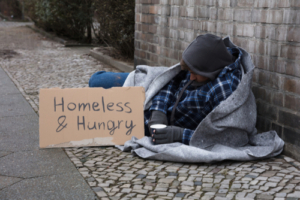California’s Homeless Crisis: A Closer Look at Public Sector Failures
California is often seen as a land of opportunity, yet it is currently grappling with one of the most troubling crises of our time: homelessness. As residents bear witness to the growing number of individuals living on the streets, the state’s response has become a focal point of heated debate, revealing inefficiencies and controversies within the public sector that are both disheartening and alarming.
A Hunger for Funding: The Financial Overhaul
In an attempt to address the crisis, California has continuously ramped up spending, yet the results tell a different story. The state’s cities have not only increased their financial allocations towards combating homelessness but have implemented tax hikes to fund these initiatives. For instance, Los Angeles has recently announced a sales tax increase to 11.25% aimed at aiding the unhoused—a move that many see as an attempt to fill the coffers of a bureaucracy that has become synonymous with ineffectiveness.
The California State Auditor’s report from last year starkly illuminated this ineffectiveness, revealing that during the five years from 2018 to 2023, nine state-funded agencies received a staggering $24 billion to combat homelessness. Yet somehow, California remains home to the nation’s largest homeless population. Where has this money gone? That’s the million-dollar question that residents are asking as they witness the number of people living without homes continue to rise.
The Taxing Cycle of Inequity
Before this latest tax hike, Los Angeles had already collected $4.6 billion through Measure H and Measure HHH, designed to provide services and build low-income housing. Notably, Measure HHH allocated $1.2 billion as a bond to construct 10,000 housing units. Regrettably, the architect of this measure, Los Angeles County Supervisor Mark Ridley-Thomas, faced severe consequences, including imprisonment for bribery and corruption. Sadly, this is not an isolated incident; it highlights a systemic issue plaguing the management of public funds in California.
Former LA Homeless Services Authority head Va Lecia Adams Kellum also contributed to the problem when she signed a questionable contract for Upward Bound House to use taxpayer money for housing, only to be found attempting to divert those funds for her husband’s business. Despite her questionable actions receiving public scrutiny, her political connections allowed her to evade immediate accountability for some time.
A Culture of Corruption
Councilman Jose Huizar, another significant player in housing initiatives, has been sentenced to 13 years in prison for accepting $1.5 billion in bribes from developers—a gross betrayal of public trust. He even went as far as to use public funds to settle personal lawsuits. These examples raise eyebrows: Are our taxes truly going toward alleviating the homelessness crisis, or are they funneled into the pockets of the corrupt?
The Cycle of More Taxes, Less Accountability
In a recent push that resonates through public discourse, Mayor Karen Bass has framed the issue of homelessness as a consequence of “greedy residents.” New measures such as Measure A—expected to generate $1 billion annually through a new countywide tax—aim to address these failings. But will this really change anything? With approximately a third of this funding directed to the already mistrusted LA County Affordable Housing Solutions Agency, skepticism runs high.
Accompanying this trend are measures like the ULA, which imposes a 4% property tax on luxury real estate transactions exceeding $5 million. While these policies aim to redistribute wealth to solve homelessness, there’s a growing concern that they merely reinforce a cycle of taxation designed more for governmental gain than genuine reform.
The Urgent Call for Responsibility
The state of California appears to be entangled in a web of taxation that doesn’t deliver the promised solutions. Amidst this crisis, residents are left to question the integrity of a system that demands more while offering less in return. At Extreme Investor Network, we believe it’s crucial to hold public officials accountable and demand transparency on how taxpayer dollars are spent.
This isn’t merely a critique of funding mismanagement; it’s a wake-up call for concerned citizens. As the state’s public sector continues to expand its reach under the guise of compassion, it often leads to the erosion of personal responsibility and agency. Instead of solving homelessness, these measures may inadvertently perpetuate a cycle of dependency and corruption—creating a society that drifts towards a notion of equality in poverty.
Conclusion: A Path Forward
California’s ongoing struggle with homelessness is a complex issue that requires more than just increased funding or punitive taxation. The answer lies in transparency, accountability, and an earnest commitment to effective use of taxpayer money that prioritizes solving the crisis. As we move forward, we must encourage public discourse that fosters innovation, not bureaucracy, in the quest for real solutions to one of our society’s most pressing issues.
Stay informed and engaged with us at Extreme Investor Network as we continue to delve into these critical issues and advocate for meaningful change.

